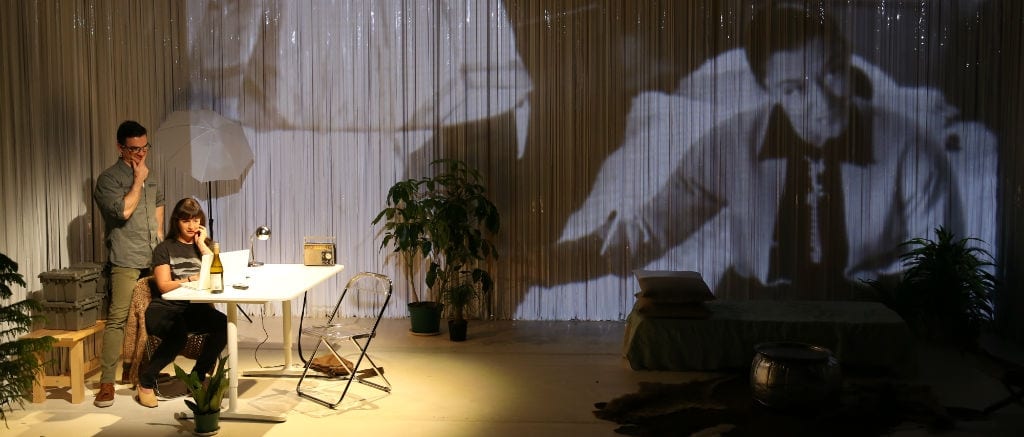In the beginning, all we know is the premise. A “playful and idiosyncratic take on the classical trip to the land of the dead,” the 59E59 Theaters website promises about The Undertaking. Then we meet Steve, a New York creative type, trying to extract a story about death from his colorful, excitable, artistic friend Lydia. He’s collecting stories about death, we learn, and she has a particularly interesting one to tell. But we never get to hear it. Lydia is far more interested in Steve’s own personal relationship with death. She doesn’t want to just talk blandly into his recorder – she wants to turn the microphone back on him.
The Undertaking is inspired by – and, in part, made up of – the recordings of interviews with real people whose death stories (collected by the real Steve Cosson, the writer and director of the show) are brought to life onscreen and through the actors. Steve and Lydia, the two main characters, are played by Aysan Celik and Dan Domingues, who captivate by slipping easily in and out of the personas of several different people – all of different ages, mindsets, and varying accents.
There’s a lot about Steve Cosson’s The Undertaking that will stick with you. With such a heavy subject as death, it would be difficult not to. Combining the interviews with two characters who parse through them for us, The Undertaking takes on the meaning of death, and what it means to interact with it. We learn some embalming techniques; we hear some near-death experiences; we learn what a “psychopomp” is. And one of the most memorable lines will resonate with me in every performance I see from now on: “When you go to the theater…there’s this aliveness, there’s this being present in a room, but there is a way that we are being ventriloquized by the dead.”
Part of what makes this performance so memorable is the use of spectacle (which would certainly have been scoffed at by the oft-referenced Aristotle). The set in the little black box theater is turned into something of a blank slate, with stark white walls that transform to illustrate the stories told by the actors. This tabula rasa is set in Lydia’s studio, where Lydia and Steve embark on their mystical journey. But the walls project many things: the woods of a near-death experience, and the Oriental rugs that cushion the mushroom journey of a cancer patient, to name a few. The walls even project scenes from French filmmaker Jean Cocteau’s Orpheus, which serves as a sort of template for the soul-searching into which Lydia leads a half-reluctant, half-excited Steve. It’s all part of a fascinating project – dare I say an undertaking – that keeps your mind racing as you take it all in.
Steve Cosson’s quirky, thought-provoking play The Undertaking is an amalgam of intelligent dialogue, Greek mythology, superstition, philosophy, and – perhaps best of all – excerpts of the stories of real people, the recorded interviews filling the theater as the actors bring their words to life on stage. But really, the whole is so much more than the sum of its parts. The Undertaking is a frank and compelling confrontation of death. And it’s not for the faint of heart. It’s erudite and it’s chuckle-worthy; at times it’s too much, and other times it leaves you wanting more. It floods you with the varied and fascinating stories of strangers, and in the process, forces you to look within yourself at your own conception of and relationship to that thing which unites us all: death.

